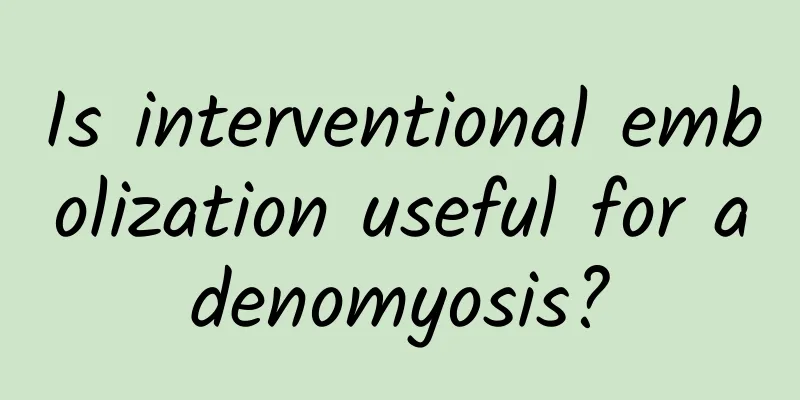Is interventional embolization useful for adenomyosis?

|
Patients with adenomyosis can choose interventional embolization therapy, which is an effective uterine preservation therapy suitable for patients who want to relieve symptoms and improve their quality of life but do not consider surgical removal of the uterus. Interventional embolization therapy blocks the blood flow of the uterine artery and reduces the blood supply to the adenomyosis tissue, thereby relieving symptoms such as pain and increased menstruation. 1What is interventional embolization therapy? Interventional embolization is a minimally invasive treatment method. The doctor inserts a catheter into the uterine artery under the guidance of imaging and injects embolic materials to block the blood supply of the diseased tissue. For patients with adenomyosis, this method can gradually shrink the diseased tissue and reduce the persistent pain and menstrual abnormalities caused by adenomyosis. Because the operation is less invasive and the recovery is fast, this technology has gradually become one of the treatment options for patients with adenomyosis. 2. Mechanism of action of interventional embolization therapy on adenomyosis The pain and menorrhagia of adenomyosis are mainly due to the inflammatory response and uterine enlargement caused by the ectopic glandular tissue in the myometrium. Interventional embolization therapy can reduce blood supply, shrink the glands in the affected area, and reduce inflammation, thereby alleviating symptoms. This treatment does not affect the basic structure of the uterus, so it is suitable for patients who need to preserve the uterus. 3. Applicable population for interventional embolization therapy This treatment is most suitable for patients with obvious symptoms, ineffective or poor results of drug treatment, and who are not suitable for surgical removal of the uterus. In particular, this treatment can be considered for patients who want to preserve their fertility, have requirements for health recovery time, or are afraid of hysterectomy. However, women who are not ready to complete childbearing should be fully evaluated before treatment, because uterine artery embolization may have a certain impact on fertility. 4. Postoperative recovery and precautions After receiving embolization therapy, patients may experience some mild discomfort, such as abdominal pain, fever or fatigue, which is normal. Doctors usually recommend 1-2 weeks of rest after surgery and long-term follow-up to observe the improvement of the condition. The diet after surgery should focus on light, avoid raw and cold food, and speed up recovery after surgery. Interventional embolization therapy provides a relatively low-risk treatment option for patients with adenomyosis that preserves the uterus. However, treatment decisions require a comprehensive assessment of the condition and personal needs. It is recommended that a clear treatment plan be developed under the guidance of a professional doctor. With a comprehensive understanding of the treatment, patients can better manage the disease and its effects. |
<<: Vaginal bleeding after abortion
>>: Can frequent dysmenorrhea lead to infertility?
Recommend
Abortion in teenage girls carries many risks
Abortion in teenage years can have a great impact...
What to do after ectopic pregnancy miscarriage?
Ectopic pregnancy abortion does not refer to the ...
Why is congenital absence of vagina difficult to cure?
Congenital absence of vagina is the most common g...
Why do patients with uterine fibroids experience abnormal uterine bleeding?
Uterine bleeding is a common symptom of uterine f...
Could taking too much probiotics cause D-lactic acid poisoning? Nutritionist You Weiming: These two types of food are safer for healthy intestines
Probiotics are "good bacteria that are benef...
Is it okay to use the air conditioner for too long? Identify the 4 major symptoms of air-conditioning disease! Nutritionist Yang Tingyi teaches you how to eat and get rid of
When the weather is hot, after walking a few step...
Office workers eat healthy! Here are 5 ways to choose buffet food
If there happens to be a cafeteria near your home...
Say goodbye to puffy and bad complexion! Women who love beauty must learn the "first aid method for edema"
Swelling is more annoying than being fat! You hav...
How do Chinese medicine practitioners treat uterine fibroids?
How does Traditional Chinese Medicine treat uteri...
What are the treatments for adnexitis?
Medical research shows that adnexitis is a common...
How to diagnose adnexitis and what tests are needed?
How to diagnose adnexitis and what tests are need...
How much does a missed abortion cost?
Nowadays, pollution is becoming more and more ser...
The best treatment for 2nd degree cervical erosion
In life, people should pay attention to the occur...
What are the symptoms of cervical hypertrophy?
In today's society, many women are prone to c...
Why is menstrual blood black?
Why is menstrual blood black? If menstrual blood ...









